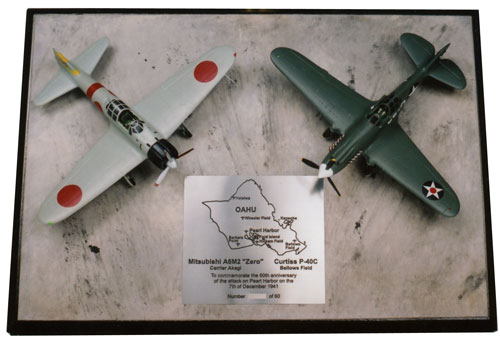Pearl Harbor 1941
Mitsubishi A6M2 ‘Zero’ and Curtiss P-40C
To commemorate the attack on Pearl Harbor.
Limited Edition of 60 only in 1/72 scale.
Curtiss P-40B, 18P, 300, 78th P.S. 15th P.G. Bellows Field, December 1941
On the 7th of December 1941 the Imperial Japanese Navy launched a surprise attack on the American Pacific Fleet based at Pearl Harbor on the island of Oahu, Hawaii, this resulted in America entering the Second World War. Like Britain some two years earlier America was not prepared, its air force were using out of date equipment.
The Curtiss P-40 was at the time America’s frontline fighter, despite this at Pearl Harbor not only did several aircraft manage to take-off during the surprise attack but they bravely engaged the enemy in what were overwhelming odds succeeding in destroying only some of the raiders.
Bellows Field was one of several satellite fields to Pearl Harbor on Oahu stationed to defend the fleet.
Aircraft 300 carries the early style call marking on its fuselage and the early national insignia on its wings and fuselage. Photographs of this aircraft show the central red circle within the star on the fuselage to have been painted out, a practice used to avoid any confusion with Japanese aircraft.
Mitsubishi A6M2 ‘Zero’, AI-155, IJN Carrier Akagi, Pearl Harbor, December 7th 1941
The carriers of the 1st Air Fleet (Akagi, Kaga, Hiryu, Soryu, Zuikaku and Shokaku) togther with fourteen other ships sailed on the 26th of November 1941, still prepared to turn back if diplomatic negotiations between Japan and the United States reached a satisfactory conclusion. They did not, and the coded signal Nitaka Yama Nobore (Climb Mount Nitaka), signifying that the Hawaiian operation was to go ahead, was transmitted to Vice-Admiral Nagumo on the 2nd of December. After refueling at sea, the fleet advanced to its flying-off position 370 km (200 nautical miles) north of Oahu the largest of the Hawaiian islands.
The first attack wave began leaving the carriers at 06.00 hours on the 7th of December, Hawaiian time. It was escorted by fourtythree Zero fighters of the first wave covering force under Lt-Cdr Shigeru Itaya, officer commanding the Akagi Fighter Squadron. Itaya’s Zeros arrived over Pearl Harbor at 07.50 Honolulu time; after shooting down a light aircraft and three trainers, they strafed Hickam and Ewa airfields, counting some twentyfive US aircraft burning on the ground. Itaya’s wingman, PO 1st Class Takashi Hirano, was shot down by American anti-aircraft fire.
Six Zeros from the Shokaku and six from the Zuikaku strafed Kaneohe and Bellows Fields, setting on fire thirtythree aircraft, many of them PBY amphibians. These two carriers did not take part in the second-wave attack on Pearl Harbor, their fighters instead flying combat air patrols (CAP) over the fleet in relays.
During the second attack, nine Zeros from the Akagi led by the highly experienced Lt Saburo Shindo were detailed to escort eighteen Aichi Type 99 (Val) dive-bombers. Arriving over the target about an hour after the first wave, and finding no opposition, the Zeros strafed Hickam Field, but only succeeded in destroying two aircraft on the ground.
The carrier Kaga despatched nine Zeros under Lt Nikaido, shooting down one aircraft and destroying about twenty more on the ground, but four of her Zeros were shot down by US fighters; it was the worst loss sustained by any of the carrier fighter squadrons.
Nine Zeros from the Soryu under Lt Fusato lida also encountered strong opposition from American fighters during the second attack, lida himself was shot down and killed in a strafing attack on Kaneohe, in which six PBYs were destroyed; Lt (Jg) lyozo Fujita took over and was leading the flight away from the target area when they were intercepted. The Japanese pilots claimed two US fighters, but lost two of their own in the action.
Eight Zeros from the Hiryu strafed Kaneohe and Bellows Fields, claiming two aircraft and a truck before becoming involved in an air battle with US fighters, two of which were shot down by PO 1st Class Tsugio Matsuyama. One Zero pilot, PO 1st Class Shigenori Nishikaichi, made a forced landing on the Hawaiian island of Niihau, and was killed by a Hawaiian. In all, the Zero squadrons lost fifteen aircraft out of a total of seventynine deployed during the Hawaiian operation. There were three hundred and eighty four US aircraft on the islands: one hundred and eighty eight were destroyed and another hundred and fifty nine damaged. Eighteen of the ninetyfour US warships in Pearl Harbor were sunk or suffered major damage; eight of those were battleships.
The aircraft shown here is featured on a section of deck from the Akagi and is painted overal in a colour called Ameiro, the ‘black’ nose was often discoloured to a purple due to the effects of engine heat and oil.
Scale 1:72
Curtiss P-40B Wingspan 6.22″ (158 mm) Weight 8.25 ozs (235 grams)
Mitsubishi A6M2 ‘Zero’ Wingspan 6.57″ (167 mm) Weight 8.25 ozs (230 grams)
Base size 12.28″ x 8.8″ (312mm x 225mm) (No. 14)
Limited edition of 60 only Total number of models produced 60


